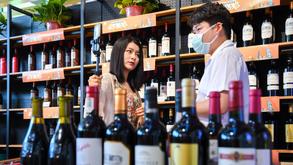 This undated photo shows salespersons promote imported wines via a cross-border e-commerce platform in Hohhot, the Inner Mongolia autonomous region. (DING GENHOU / CHINA DAILY)
This undated photo shows salespersons promote imported wines via a cross-border e-commerce platform in Hohhot, the Inner Mongolia autonomous region. (DING GENHOU / CHINA DAILY)
E-commerce operators will be held accountable if they do not review the business licenses of food sellers on their platforms and cause food safety problems, China's top court said.
The Supreme People's Court issued a judicial interpretation on handling civil disputes involving food safety on Dec 9, further specifying the responsibilities and obligations of e-commerce platform operators to give stronger legal protection to consumers and ensure food safety in cyberspace.
The interpretation clarifies e-commerce operators should conduct real-name registration and check the business licenses of those selling food on their platforms. If the operators do not carry out their obligations, causing food safety incidents or harming the legitimate rights of consumers, they will be held liable along with the food sellers or producers, it said.
E-commerce operators are also ordered to report unsafe food sold on their platforms to supervision departments and stop providing online services for such food sellers in line with the interpretation, which will come into force on Jan 1.
As a bridge between consumers and food sellers, e-commerce operators have the right as well as the obligation to review whether foods sold on their platforms are qualified.
Liu Junhai, law professor at the Renmin University of China
Liu Junhai, a law professor from Renmin University of China, welcomed the legal document, saying the clearer stipulations will remind e-commerce platform operators that consumer safety must always be a top priority as they benefit from providing online services for food sellers.
ALSO READ: E-commerce center helps lift incomes
"As a bridge between consumers and food sellers, e-commerce operators have the right as well as the obligation to review whether foods sold on their platforms are qualified," he said.
Comparing e-commerce platforms to gatekeepers, he added they should take the initiative to say "no" to unsafe food.
Zheng Xuelin, chief judge of the top court's No 1 Civil Division, said they paid close attention to e-commerce platforms and specified what they should do in the interpretation "because we've seen many online shopping disputes involving food".
Statistics released by the top court showed that courts across the country heard about 49,000 cases related to online shopping contracts from 2017 to the end of June, of which more than 45 percent involved food.
"Food safety must be safeguarded by the rule of law, as it's what the public cares about most and relates to their safety and health," Zheng added.
In November, a report issued by the Justice Big Data Institute also indicated that food safety was a major complaint when consumers came to court over online shopping disputes, followed by electronic and healthcare products.
READ MORE: E-commerce playing key role in economic revival
Contact the writer at caoyin@chinadaily.com.cn


